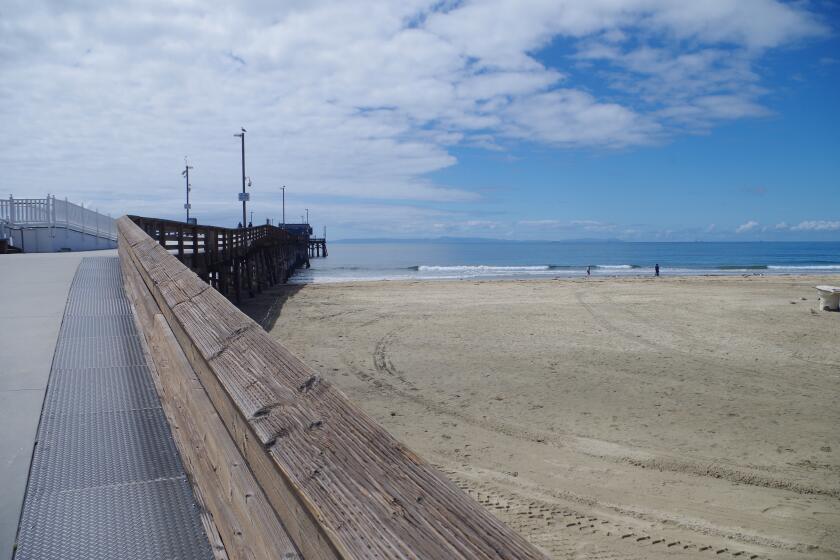Setting up camp in Sequoia
- Share via
On the Fourth of July, our three-car caravan headed up to the
Lodgepole Campground in Sequoia National Park.
In the cars were my husband, Marce, and me and our three
daughters, Elizabeth, Emily and Erin Almaraz. We also brought along
Erin’s friend, Stephanie Wheeler, and Elizabeth’s boyfriend, Jim
Kuhl. We were joined by my sister-in-law, her husband and their two
boys, and my in-laws -- 13 in all, with two more driving up later.
Our campsites were on the edge of the Kaweah River, which was
still running high with snow runoff. Friends did not quite believe me
when I told them I was going camping -- in a tent. It can be done,
comfortably, if you have the right equipment. That includes: air
mattresses; cards for the nightly poker game; a husband who knows how
to light a fire and put up tents; and a mother-in-law who led Girl
Scout camp-outs for years and knows how to pack first-rate dinners in
dry ice to ensure that everyone stays full and happy.
There are many things to do in Sequoia. The day after we set up
camp, we drove our cars through the Tunnel Log, which is a fallen
sequoia that has a tunnel carved into it so that cars can drive right
through! Then we climbed nearly 400 steps up to reach the top of Moro
rock, a large granite dome that provides an exceptional view of the
Great Western Divide and the many canyons below.
After recovering from this strenuous (at least for me) hike, we
stopped at Crescent Meadow, one of the most beautiful meadows in all
the Sequoias. Just off the meadow, we walked to Tharp’s Log, which is
a fallen sequoia that was converted into a summer cabin by Hale Tharp
in the 1860s. On the way back, we spotted a rattlesnake, curled up in
a perfect ring, sunning himself on a log. We took a picture and left
him to his rest.
The next day, we descended into Crystal Cave. This cave was carved
by water through a 750-foot-high wall of limestone that transformed,
over the centuries, into a slab of blue and white marble. The
stalactites and stalagmites and other formations are incredible. The
organ room is not to be missed -- named after the sediment formations
that resemble the pipes of a large pipe organ. Sweaters are required
for this tour, since the cave stays at a constant 50 degrees
Fahrenheit.
We also took a day to explore the Giant Forest, home of the
General Sherman tree, which is the world’s largest living tree and is
nearly 2,100 years old. We took the nearby two-mile walk on the
Congress Trail, which led us through the Giant Forest where we saw
many giant sequoias. The kids loved scrambling into the centers of
the trees that were hollowed out by fire. We fit 10 people inside one
of the trees.
While we enjoyed the many natural wonders that Sequoia offers,
camping is also a wonder in itself. Setting up tents, catching fish
-- or not -- for dinner, making sure that you have enough quarters
for the showers. Everything became an adventure.
We held a contest for the most bug bites. Our young friend,
Stephanie Wheeler, won with a whopping 21.
Hot oatmeal in the morning tastes better at camp than at any other
place or time.
The evenings are full of looking for your flashlight, listening to
the nightly forest ranger campfire chat, watching the youngest
campers become the hottest card sharks, making s’mores and looking up
at the stars.
And, of course, we spent time talking about bears. The last time
we camped, we would hear campers banging pots to chase out nosy bears
every night. But not so in early July. In fact, many of the deer had
given birth two weeks before our arrival. So instead of chasing bears
with pots, we were chasing white-spotted fawns with cameras. A few
bears did cross our paths during some of our afternoon outings.
However, while they came close enough for pictures, they were never
near the campsites.
Camping in tents in such a beautiful setting is an adventure that
can truly bring a family closer together. We left with a sense of
having mastered some new skills and seen some incredible natural
wonders. Our ability to survive this wilderness adventure left each
of us with memories of an unforgettable experience.
* JEANNE ALMARAZ is a Newport Beach resident.
All the latest on Orange County from Orange County.
Get our free TimesOC newsletter.
You may occasionally receive promotional content from the Daily Pilot.



